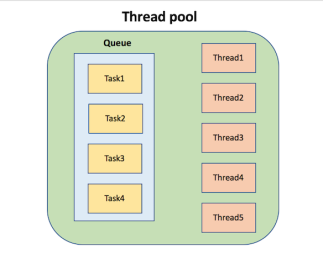Since int is a
primitive and since we want a sharable resource , so it must be a reference
which needs to be shared within 5 threads.
If Integer being
used, since Integer is Immutable hence any change on Integer reference will
create a new Object , so it must be avoided.
Its desirable to create own NonMutableInteger reference and share the reference to multiple
thread using Threadpool
/* To check
the minimum and maximum value of count
* Minimum - Nothing to be Guaranteed(Race condition can happen)
* Maximum
- 25*/
public class
ThreadMinMaxCount {
public static void main(String[] args) {
/* Integer is an Immutable class and
hence not used */
NonMutableInteger count = new
NonMutableInteger(0);
ExecutorService service = Executors.newFixedThreadPool(5);
for (int i = 0; i < 5; i++)
service.execute(new Task(count));
System.out.println(count.i);
service.shutdown();
}
}
class Task implements Runnable {
NonMutableInteger count;
public
Task(NonMutableInteger count) {
this.count = count;
}
@Override
public void run() {
for (int i = 0; i < 5; i++)
count.increment();
}
}
class
NonMutableInteger {
int i;
public
NonMutableInteger(int i) {
this.i = i;
}
public int
getMutableInteger() {
return i;
}
public void increment() {
i++;
}
}
Output (Run
multiple times)
10
5
20
10
5
20

